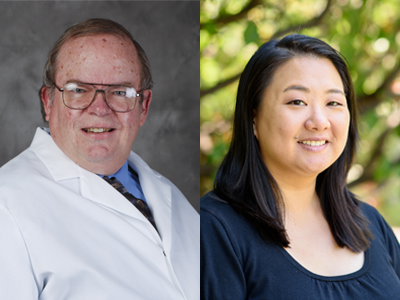
V.O. Speights, DO, FCAP, was a pathologist at Scott & White Hospital in Temple, Texas. Dr. Speights passed away prior to submitting a final draft of this blog. Sue Chang, MD, FCAP, a practicing pathologist and assistant clinical professor of pathology at the City of Hope Comprehensive Cancer Center in Duarte, California, edited and finalized the content in his honor.
There’s a member of the health care team who plays a vital role in diagnosing cancer and developing a treatment plan who you may never meet face to face: the pathologist. This is the doctor who analyzes the tissue samples to make the correct diagnosis.
Two pathologists answer questions on why cancer sometimes seems to “run in the family” and what you need to know about evaluating your own inherited cancer risk.
1. Can cancer be inherited?
Genes contain the information your body uses to grow and function. You have 2 copies of each gene, with 1 copy inherited from each parent. Sometimes, particular mutations, or changes, to genes can increase the risk of developing cancer. These mutations may be a sporadic, one-time change that occurs during your life. Or, the mutations may be inherited from your parents.
When a certain type of cancer seems to be common in a family, doctors may be able to identify the specific genetic change causing the increased risk. These types of genetic changes are called “hereditary cancers” or “inherited cancer syndromes.” Specific laboratory tests can identify these changes before cancer even develops.
These types of genetic changes are called “hereditary cancers” or “inherited cancer syndromes.” Specific laboratory tests can identify these changes before cancer even develops.
An example of inherited genetic changes that may increase a person’s risk of developing cancer, and at an earlier age than other people, are BRCA1 and BRCA2 mutations. These mutations increase the risk of breast cancer and pancreatic cancer in both men and women, the risk of ovarian cancer in women, and the risk of prostate cancer in men.
2. What are the signs that I may have an inherited cancer syndrome?
Many times, the first tool in detecting an inherited cancer syndrome is a family history of cancer. Knowing your family history helps your doctor begin to think about whether inherited cancer syndromes may be a possibility. If you have a family member who has already been diagnosed with an inherited cancer syndrome, they may know the specific genetic change that your doctor should consider. The ethnic origin of your ancestors may also play a role in determining which cancers you’re more likely to inherit.
Some cancers look a specific way under the microscope as a result of a genetic mutation. If you have cancer, the pathologist analyzing your tissue sample would alert your doctor to the possibility that it may have been inherited. For example, a particular type of thyroid cancer is strongly associated with familial adenomatous polyposis (FAP). This genetic condition also significantly increases the risk of cancer in the colon, small intestine, and stomach. Knowing about FAP means that entire families can join screening programs for early detection.
3. How do I get tested for an inherited cancer syndrome?
Diagnosing an inherited cancer syndrome before or after cancer develops requires a combination of family history, genetic counseling, genetic testing, and laboratory testing. A genetic counselor or clinical geneticist can help you decide if genetic testing would be useful for you.
Genetic tests can be performed on a sample of fresh blood or on preserved tissue that was previously taken in a biopsy or surgery. Testing techniques can vary, and the technology is evolving rapidly. Some detailed laboratory testing can even be done years after an initial cancer diagnosis.
4. What does it mean if I have an inherited cancer syndrome?
Having an inherited cancer syndrome means having an increased risk for developing cancer, but it does not necessarily mean you will develop cancer. Any siblings or children you have may share the same genetic changes and may also be at increased risk. If doctors know that 1 person in a family has an inherited cancer syndrome, it can help make others in the family aware of their potential, personal risk of developing cancer.
Any siblings or children you have may share the same genetic changes and may also be at increased risk. If doctors know that 1 person in a family has an inherited cancer syndrome, it can help make others in the family aware of their potential, personal risk of developing cancer.
The good news is that the medical community has many ways to help manage inherited risks for cancer. They can include counseling and education, increased screening tests, and risk-reduction strategies, such as medical and surgical treatment. You may also be eligible for clinical trials, or research studies, targeted at your specific inherited cancer syndrome.
This content was created by and provided in collaboration with the College of American Pathologists.
